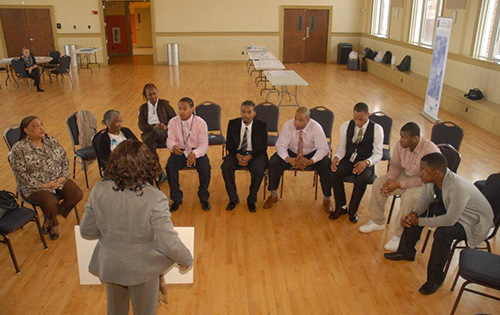
Last year, a New York Times quiz asked readers, “Is This a Hospital or a Hotel?” Twelve images showed gleaming lobbies, full-service spas, an artfully plated serving of fresh salmon, and the like. Of the 12, seven are in hospitals and five are in hotels, but the differences in services offered are slight. As the article noted, “There has been a boom in new hospital construction, featuring high-concept designs and amenities,” even though many hospitals are public funded, not-for-profit institutions.
Such high-concept designs ill serve one constituency in dire need of better health care: young African-American males, a group that, as I wrote here last week, faces enormous disparities in health and life span compared to their white counterparts. A recent editorial in the Journal of the American Medical Association (JAMA) notes that urban, 16-year-old African-American males have only a 50 to 62 percent chance of surviving to age 65, in contrast to their white counterparts who have an 80 percent chance of living that long.
“Public hospitals and clinics have been disappearing for decades, and the ones that have replaced them, for-profit or not, have generally not looked to cultivate young African-American men as patients,” Stephen A. Martin, the lead author of the editorial, wrote to me via email. As he and his coauthors, Kenn Harris and Brian W. Jack, write in JAMA, “The care youth and men need most,”—effective social supports, rather than the traditional health care model—“is the care least available.”
Martin, a physician at Boston Medical Center, and his coauthors suggest several ways health services can be better designed to meet the needs of young African-American males. These include creating “an open door and trusted space” where young men are met on their own terms. Boys and Girls Clubs, schools, barbershops, churches and mosques, for example, should be cultivated as alternatives to health centers for delivering care, they say. Existing centers can be made more male-friendly and father-friendly, offering a welcoming environment for young men. An analogy is electronics and athletics stores, which develop inviting spaces for customers.
Established programs could extend their reach to include black males. The National Healthy Start Association, which promotes “positive prenatal health behaviors” to improve the wellbeing of newborns in communities of color, has traditionally focused on mother-and-child issues. It is now expanding its outreach to fathers, according to Kenn Harris, president-elect of the National Healthy Start Association.
“We have too narrow a view of what health care can and should be,” Martin wrote in his comments to me. “We know we can be more successful when we fund social supports more generously and also combine them with a medical presence.” For example, the Preventive Food Pantry at Boston Medical Center offers not just food to low-income patients with diabetes, HIV/AIDS, cancer, and other chronic conditions, but also links clients to physicians and nutritionists.
As Martin notes, “these circumstances of social-support impoverishment and health care riches didn’t magically appear.… Health care lobbying in Washington has far and away more spending than any other sector. Needless to say, young African-American men and the health concerns they face do not have a large lobbying presence.”

